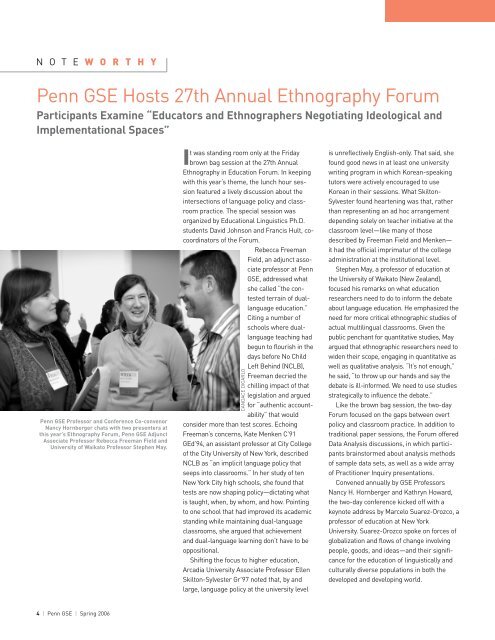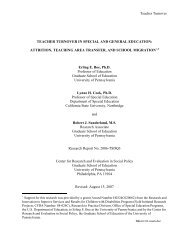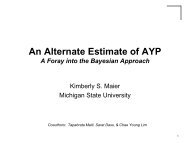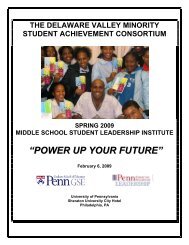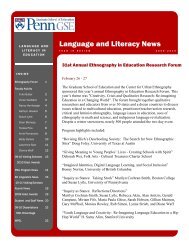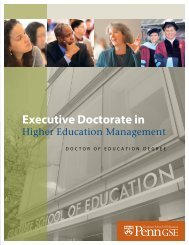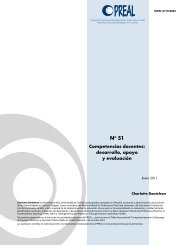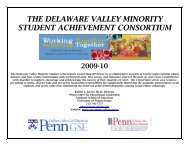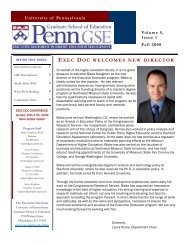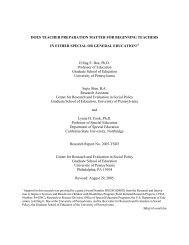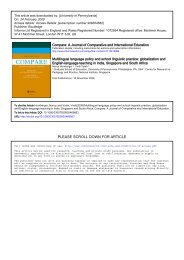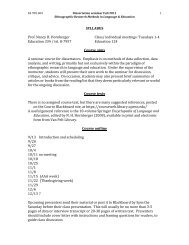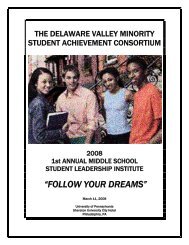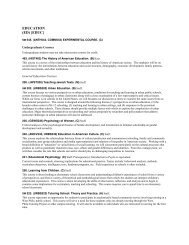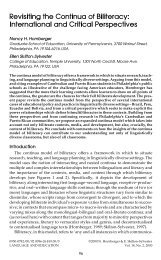to download the entire magazine - Penn GSE - University of ...
to download the entire magazine - Penn GSE - University of ...
to download the entire magazine - Penn GSE - University of ...
Create successful ePaper yourself
Turn your PDF publications into a flip-book with our unique Google optimized e-Paper software.
N O T E W O R T H Y<br />
<strong>Penn</strong> <strong>GSE</strong> Hosts 27th Annual Ethnography Forum<br />
Participants Examine “Educa<strong>to</strong>rs and Ethnographers Negotiating Ideological and<br />
Implementational Spaces”<br />
<strong>Penn</strong> <strong>GSE</strong> Pr<strong>of</strong>essor and Conference Co-convenor<br />
Nancy Hornberger chats with two presenters at<br />
this year’s Ethnography Forum, <strong>Penn</strong> <strong>GSE</strong> Adjunct<br />
Associate Pr<strong>of</strong>essor Rebecca Freeman Field and<br />
<strong>University</strong> <strong>of</strong> Waika<strong>to</strong> Pr<strong>of</strong>essor Stephen May.<br />
It was standing room only at <strong>the</strong> Friday<br />
brown bag session at <strong>the</strong> 27th Annual<br />
Ethnography in Education Forum. In keeping<br />
with this year’s <strong>the</strong>me, <strong>the</strong> lunch hour session<br />
featured a lively discussion about <strong>the</strong><br />
intersections <strong>of</strong> language policy and classroom<br />
practice. The special session was<br />
organized by Educational Linguistics Ph.D.<br />
students David Johnson and Francis Hult, cocoordina<strong>to</strong>rs<br />
<strong>of</strong> <strong>the</strong> Forum.<br />
Rebecca Freeman<br />
Field, an adjunct associate<br />
pr<strong>of</strong>essor at <strong>Penn</strong><br />
<strong>GSE</strong>, addressed what<br />
she called “<strong>the</strong> contested<br />
terrain <strong>of</strong> duallanguage<br />
education.”<br />
Citing a number <strong>of</strong><br />
schools where duallanguage<br />
teaching had<br />
begun <strong>to</strong> flourish in <strong>the</strong><br />
days before No Child<br />
Left Behind (NCLB),<br />
Freeman decried <strong>the</strong><br />
chilling impact <strong>of</strong> that<br />
legislation and argued<br />
for “au<strong>the</strong>ntic accountability”<br />
that would<br />
consider more than test scores. Echoing<br />
Freeman’s concerns, Kate Menken C’91<br />
GEd’94, an assistant pr<strong>of</strong>essor at City College<br />
<strong>of</strong> <strong>the</strong> City <strong>University</strong> <strong>of</strong> New York, described<br />
NCLB as “an implicit language policy that<br />
seeps in<strong>to</strong> classrooms.” In her study <strong>of</strong> ten<br />
New York City high schools, she found that<br />
tests are now shaping policy—dictating what<br />
is taught, when, by whom, and how. Pointing<br />
<strong>to</strong> one school that had improved its academic<br />
standing while maintaining dual-language<br />
classrooms, she argued that achievement<br />
and dual-language learning don’t have <strong>to</strong> be<br />
oppositional.<br />
Shifting <strong>the</strong> focus <strong>to</strong> higher education,<br />
Arcadia <strong>University</strong> Associate Pr<strong>of</strong>essor Ellen<br />
Skil<strong>to</strong>n-Sylvester Gr’97 noted that, by and<br />
large, language policy at <strong>the</strong> university level<br />
CANDACE DICARLO<br />
is unreflectively English-only. That said, she<br />
found good news in at least one university<br />
writing program in which Korean-speaking<br />
tu<strong>to</strong>rs were actively encouraged <strong>to</strong> use<br />
Korean in <strong>the</strong>ir sessions. What Skil<strong>to</strong>n-<br />
Sylvester found heartening was that, ra<strong>the</strong>r<br />
than representing an ad hoc arrangement<br />
depending solely on teacher initiative at <strong>the</strong><br />
classroom level—like many <strong>of</strong> those<br />
described by Freeman Field and Menken—<br />
it had <strong>the</strong> <strong>of</strong>ficial imprimatur <strong>of</strong> <strong>the</strong> college<br />
administration at <strong>the</strong> institutional level.<br />
Stephen May, a pr<strong>of</strong>essor <strong>of</strong> education at<br />
<strong>the</strong> <strong>University</strong> <strong>of</strong> Waika<strong>to</strong> (New Zealand),<br />
focused his remarks on what education<br />
researchers need <strong>to</strong> do <strong>to</strong> inform <strong>the</strong> debate<br />
about language education. He emphasized <strong>the</strong><br />
need for more critical ethnographic studies <strong>of</strong><br />
actual multilingual classrooms. Given <strong>the</strong><br />
public penchant for quantitative studies, May<br />
argued that ethnographic researchers need <strong>to</strong><br />
widen <strong>the</strong>ir scope, engaging in quantitative as<br />
well as qualitative analysis. “It’s not enough,”<br />
he said, “<strong>to</strong> throw up our hands and say <strong>the</strong><br />
debate is ill-informed. We need <strong>to</strong> use studies<br />
strategically <strong>to</strong> influence <strong>the</strong> debate.”<br />
Like <strong>the</strong> brown bag session, <strong>the</strong> two-day<br />
Forum focused on <strong>the</strong> gaps between overt<br />
policy and classroom practice. In addition <strong>to</strong><br />
traditional paper sessions, <strong>the</strong> Forum <strong>of</strong>fered<br />
Data Analysis discussions, in which participants<br />
brains<strong>to</strong>rmed about analysis methods<br />
<strong>of</strong> sample data sets, as well as a wide array<br />
<strong>of</strong> Practitioner Inquiry presentations.<br />
Convened annually by <strong>GSE</strong> Pr<strong>of</strong>essors<br />
Nancy H. Hornberger and Kathryn Howard,<br />
<strong>the</strong> two-day conference kicked <strong>of</strong>f with a<br />
keynote address by Marcelo Suarez-Orozco, a<br />
pr<strong>of</strong>essor <strong>of</strong> education at New York<br />
<strong>University</strong>. Suarez-Orozco spoke on forces <strong>of</strong><br />
globalization and flows <strong>of</strong> change involving<br />
people, goods, and ideas—and <strong>the</strong>ir significance<br />
for <strong>the</strong> education <strong>of</strong> linguistically and<br />
culturally diverse populations in both <strong>the</strong><br />
developed and developing world.<br />
4 | <strong>Penn</strong> <strong>GSE</strong> | Spring 2006


